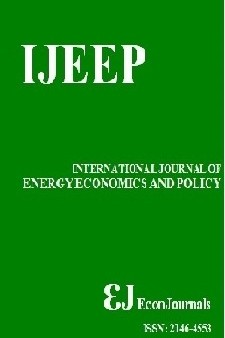The Joint Effects of Oil Price Volatility and Environmental Risks on Non-Performing Loans: Evidence from Panel Data of Organisation of the Petroleum Exporting Countries
The Joint Effects of Oil Price Volatility and Environmental Risks on Non-Performing Loans: Evidence from Panel Data of Organisation of the Petroleum Exporting Countries
Oil Price Volatility, Environmental Risks Non-performing Loans, Organization of the Petroleum Exporting Countries,
- Başlangıç: 2011
- Yayıncı: İlhan ÖZTÜRK
Economic and Technical Feasibility of Metering and Sub-metering Systems for Heat Accounting
Luca CELENZA, Marco DELL’ISOLA, Giorgio FİCCO, Marco GRECO, Michele GRİMALDİ
China in Innovative Development of Alternative Energy Advanced Industrial Technologies
Mihail Nikolaevich DUDİN, еvgenia еvgenevna FROLOVA, Petr Aleksandrovich KUCHERENKO, Vitaly Aleksandrovic VERNİKOV, Natalia Andreevna VOYKOVA
Dana Saylauovna BEKNİYAZOVA, Arman AKİSHEV, İldar KALİYEV, Gulnara Turganovna SHAMSHUDİNOVA, Meiramgul Armiyanovna ALTYBASSAROVA
Gas Flaring Effects and Revenue Made from Crude Oil in Nigeria
Nasiru YUNUSA, İsmail Tijjani IDRİS, Adamu Garba ZANGO, Muhammad Umar KİBİYA
Munshi Naser Ibne Afzal, Jeff Gow
The Changing Energy Intensity in Indian Economy: A Sector-level Analysis Based on Input-Output Model
Sakiru Adebola SOLARİN, Muhammad SHAHBAZ, Syed Jawad Hussain SHAHZAD
Trade-off Curves and Elasticity Analysis in Multi Fuel Options System and Combined Problem
Ali NAZEMİ, Seyed Farid GHADERİ, Shadi Khalil MOGHADAM, Anahita FARSAEİ
Barriers to Energy Saving for Public Middle Schools in Bangkok: From School Management Perspective
Wuttipan KİATRUANGKRAİ, Ekachai LEELARASMEE
Co-integration between Electricity Supply and Economic Growth in South Africa
